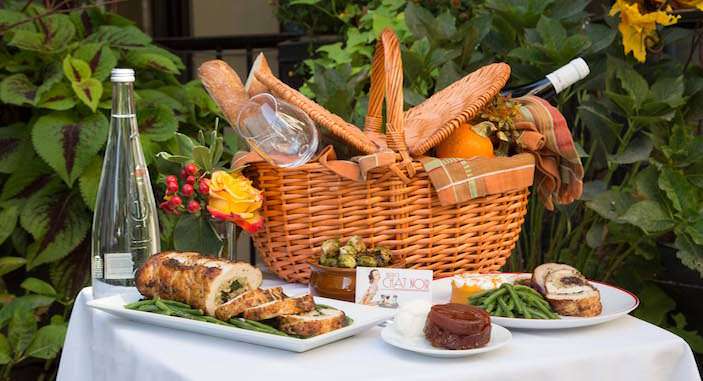It’s December, which means time for feasts and festivities with loved ones! Over the next few weeks year-long dreams of consuming seasonal delicacies and your holiday favorites will become reality. Books about food are a great way to fill a craving without packing on all the extra pounds this time of year. Here’s a selection of books where foods of all kinds, from all cultures are the focus. Each one is so beautifully written with detailed descriptions of food that are so vivid, you can almost taste them!
Ranging from cookbooks to psychological thrillers, these reads are bound to make your mouth water with saucy plots and and tempting titles. Go on…indulge your appetite for something great to read!
Pok Pok The Drinking Food of Thailand, Andy Ricker
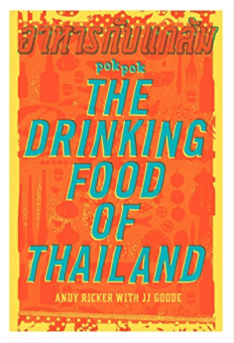 Andy Ricker offers 50 delicious recipes in his follow-up release to Pok Pok, a “celebration of the thrill and spirit of Thai drinking food.” With detailed descriptions of each dish that will make your mouth water, this cookbook also contains anecdotes from the Thai cooks who assisted Ricker through the process of assembling this collection, providing readers with insight into Thai culture as well as delicious products of their recipes. Some notable recipes include Yam Kop (Northern Thai frog soup) and Kaeng Awm Neua (Northern Thai stewed beef); in fact, Ricker’s description of the latter serves as one example of the types of mouth-watering details stuffed within the book that brings the taste and smells of Thailand into your own kitchen:
Andy Ricker offers 50 delicious recipes in his follow-up release to Pok Pok, a “celebration of the thrill and spirit of Thai drinking food.” With detailed descriptions of each dish that will make your mouth water, this cookbook also contains anecdotes from the Thai cooks who assisted Ricker through the process of assembling this collection, providing readers with insight into Thai culture as well as delicious products of their recipes. Some notable recipes include Yam Kop (Northern Thai frog soup) and Kaeng Awm Neua (Northern Thai stewed beef); in fact, Ricker’s description of the latter serves as one example of the types of mouth-watering details stuffed within the book that brings the taste and smells of Thailand into your own kitchen:
“…laap, minced meat cooked with a paste of dried spices and shrimp paste, is among the plates. So, too, are slowly grilled pork neck and intestines, plucked from glistening piles on a charcoal grill out front and served with fiery tamarind-spiked sauce for dipping… like many curries, it relies on a paste pounded in a mortar; in this case, one that features a very Northern Thai combination of moderately spicy dried chiles, turmeric root, lemongrass, and galangal. Like many soups, it is brothy, and depending on where you get it and how long it’s been sitting on the stove that night, it ranges from stock-thin to stew-thick. Either way, it’s salty, spicy, and herbaceous, with each bite satisfyingly intense.”
Behold the Dreamers, Imbolo Mbue
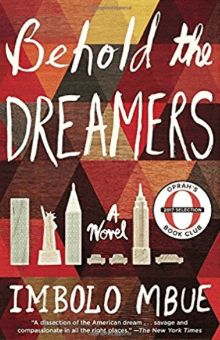 Jende and Neni, a young Cameroonian couple, immigrate into Harlem in search of better lives for them and their six-year old son. Imbolo Mbue’s debut novel, Behold the Dreamers, is a portrait of race and the immigrant experience as the city reels from the shock of the Great Recession. Jende and Neni’s story is told side-by-side with the story of their wealthy American employers, giving readers several different lenses through which to view the story. Mbue provides insight into African culture, as well as beautifully depicted characters, through her intricately-wrought language. She describes American food with as much detail as she does with Cameroonian fare, painting a lush portrait of both sides of Jende and Neni’s identities; a fancy American feast is described as offering:
Jende and Neni, a young Cameroonian couple, immigrate into Harlem in search of better lives for them and their six-year old son. Imbolo Mbue’s debut novel, Behold the Dreamers, is a portrait of race and the immigrant experience as the city reels from the shock of the Great Recession. Jende and Neni’s story is told side-by-side with the story of their wealthy American employers, giving readers several different lenses through which to view the story. Mbue provides insight into African culture, as well as beautifully depicted characters, through her intricately-wrought language. She describes American food with as much detail as she does with Cameroonian fare, painting a lush portrait of both sides of Jende and Neni’s identities; a fancy American feast is described as offering:
“…wickedly delectable creations like sesame seared tuna with lemon-wasabi vinaigrette; beef tenderloin and olives on garlic crostini with horseradish sauce; California caviar and chives on melba toast; mushroom caps stuffed with jumbo lump crab meat; steak tartare with ginger and shallot, which she loved the most and devoured without restraint…”
Likewise, Cameroonian food is presented with the same care and attention to detail:
“All afternoon she stayed in the kitchen, making egusi stew with smoked turkey, garri and okra soup, fried plantains and beans, jollof rice with chicken gizzard, and ekwang, which took two hours to make because she had to peel the cocoyams, grate them, tightly and painstakingly wrap tea-spoons of the grated cocoyam into spinach leaves, then simmer in a pot with palm oil, dried fish, crayfish, salt, pepper, maggi, and bush onions, for an hour.”
The Expatriates, Janice Y.K. Lee
 Janice Y.K. Lee’s novel The Expatriates details the lives of three American women living in Hong Kong. Mercy, Hilary, and Margaret are American expatriates in different stages of life who struggle both with finding peace within themselves and adapting to their new, unfamiliar environment. Hong Kong is painted with a colorful brush, sparing no details about the experience of Americans who navigate lives in the bustling city. This novel also works with themes of motherhood, class hierarchies, marital and familial relationships, and love. Lee is generous with her language, not only in describing food but in every aspect of the world she creates. Right away, from the first chapter the reader is treated to a detailed description of a “slow-roasted unicorn,” which is an unconventional pairing of words that nonetheless sounds strangely delicious when brought to life by Lee’s words:
Janice Y.K. Lee’s novel The Expatriates details the lives of three American women living in Hong Kong. Mercy, Hilary, and Margaret are American expatriates in different stages of life who struggle both with finding peace within themselves and adapting to their new, unfamiliar environment. Hong Kong is painted with a colorful brush, sparing no details about the experience of Americans who navigate lives in the bustling city. This novel also works with themes of motherhood, class hierarchies, marital and familial relationships, and love. Lee is generous with her language, not only in describing food but in every aspect of the world she creates. Right away, from the first chapter the reader is treated to a detailed description of a “slow-roasted unicorn,” which is an unconventional pairing of words that nonetheless sounds strangely delicious when brought to life by Lee’s words:
“A slow-roasted unicorn. A baked, butterflied baby dragon, spread-eagled, spine a delicate slope in the pan. A phoenix, perhaps, slightly charred from its fiery rebirth, sprinkled with sugar, flesh caramelized from the heat. That’s what she wants to eat: a mythical creature, something slightly otherworldly, something not real. A centaur. Yes, the juicy haunch of a centaur.”
More descriptions of Hong Kong street food, chestnuts with “soft shells” and “the warm meat of the nut,” and a particularly beautiful rendering of a cream-cheese-and-olive sandwich are tucked within the book:
“The small space heater in the corner is sputtering out some warmth, and she is making a cream-cheese-and-olive sandwich. She takes out the cream cheese from the small box refrigerator she bought a few weeks ago, which reminds her of college days. The cream cheese is thick and white and comforting as she slides her knife out of the container. She spreads it across the thick multigrain bread. She slices the olives and studs the cream cheese with the bits, fingers slippery with oil. Her mouth is watering. What a marvelous combination, the smooth creaminess and the salty oil, paired with the heartiness of the bread.”
Hazana: Jewish Vegetarian Cooking, Paola Gavin
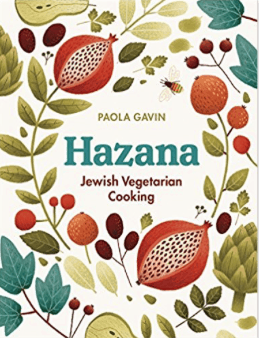 Hazana is at once a cookbook and a culinary tour into Jewish history, highlighting the core component of food in the heart of Jewish life. All of the recipes included are vegetarian, a reflection of the mostly plant-based diets of the Jewish people who settled in the Promised Land; common ingredients include bread, goat and sheep cheese, dates, olives and nuts, and all types of fruit, all of which still make up the modern Jewish diet. Hazana shares over 140 Jewish recipes from over twenty countries, providing meticulously-curated cultural notes along the way: descriptions of Jewish holidays and festivals, history, and traditions that have been passed down for multiple generations. One section explores the role of eggs in Jewish culture and tradition, noting how “eggs– especially raw eggs with double yolks– were often given to young brides to increase their fertility and protect them from evil,” followed by an explanation of huevos haminados (hamine eggs) that Sephardic Jews prepared, one that sounds utterly delicious:
Hazana is at once a cookbook and a culinary tour into Jewish history, highlighting the core component of food in the heart of Jewish life. All of the recipes included are vegetarian, a reflection of the mostly plant-based diets of the Jewish people who settled in the Promised Land; common ingredients include bread, goat and sheep cheese, dates, olives and nuts, and all types of fruit, all of which still make up the modern Jewish diet. Hazana shares over 140 Jewish recipes from over twenty countries, providing meticulously-curated cultural notes along the way: descriptions of Jewish holidays and festivals, history, and traditions that have been passed down for multiple generations. One section explores the role of eggs in Jewish culture and tradition, noting how “eggs– especially raw eggs with double yolks– were often given to young brides to increase their fertility and protect them from evil,” followed by an explanation of huevos haminados (hamine eggs) that Sephardic Jews prepared, one that sounds utterly delicious:
“Whole eggs are simmered very slowly overnight with a little oil and some onion skins until their shells turn dark brown– sometimes coffee grounds are added to enhance the colours. Originally, they were baked in an oven, covered with embers, which explains the literal translation of their name: ‘oven eggs.’”
The Vegetarian, Han Kang
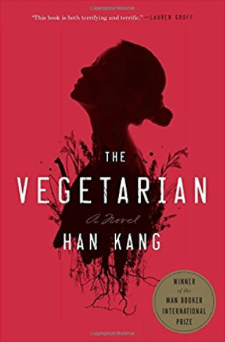 The Vegetarian, winner of the 2016 Man Booker International Prize, is a dark commentary on the relationship between power and the body, as well as an observation on the oppressive side of Korean culture. Saturated with beautiful language that leaves one breathless, Han Kang’s novel explores the life of Yeong-hye, a Korean housewife, and how her nightmare-driven decision to become a vegetarian generates outrage and frustration in the people who are appalled at her small act of asserting her independence, including her husband, sister, and brother-in-law. This novel is a dark thriller, and leaves a haunting, lingering imprint upon readers’ consciousnesses. Food plays a large role in this novel, so it is only fitting that a lush, savory description of traditional Korean fare is presented in the beginning of the novel:
The Vegetarian, winner of the 2016 Man Booker International Prize, is a dark commentary on the relationship between power and the body, as well as an observation on the oppressive side of Korean culture. Saturated with beautiful language that leaves one breathless, Han Kang’s novel explores the life of Yeong-hye, a Korean housewife, and how her nightmare-driven decision to become a vegetarian generates outrage and frustration in the people who are appalled at her small act of asserting her independence, including her husband, sister, and brother-in-law. This novel is a dark thriller, and leaves a haunting, lingering imprint upon readers’ consciousnesses. Food plays a large role in this novel, so it is only fitting that a lush, savory description of traditional Korean fare is presented in the beginning of the novel:
“Tongs in one hand and a large pair of scissors in the other, she’d flipped rib meat in a sizzling pan while snipping it into bite-sized pieces, her movements deft and practiced. Her fragrant, caramelized deep-fried belly pork was achieved by marinating the meat in minced ginger and glutinous starch syrup. Her signature dish had been wafer-thin slices of beef seasoned with black pepper and sesame oil, then coated with sticky rice powder as generously as you would with rice cakes or pancakes, and dipped in bubbling shabu-shabu broth. She’d made bibimbap with bean sprouts, minced beef, and pre-soaked rice stir-fried in sesame oil. There had also been a thick chicken and duck soup with large chunks of potato, and a spicy broth packed full of tender clams and mussels, or which I could happily polish off three helpings in a single sitting.”
Caroline: Little House, Revisited, Sarah Miller
 “White flour, white sugar, lard, and milk. Saleratus, and a pinch of nutmeg. The white flour was so silky and cool, Caroline mixed the dough bare-handed until it was warm and smooth as her own skin. She rolled it into a thick circle as large as the pie plate, then neatened the rough edges with the heels of her hands. With a knife she cut out two hearts and dredged them with white sugar until they glittered faintly in the lamplight. Quietly, she placed a layer of stones in the bottom of the bake oven, laid the heart-shaped cakes carefully into the pie plate, and lowered the plate into the oven.”
“White flour, white sugar, lard, and milk. Saleratus, and a pinch of nutmeg. The white flour was so silky and cool, Caroline mixed the dough bare-handed until it was warm and smooth as her own skin. She rolled it into a thick circle as large as the pie plate, then neatened the rough edges with the heels of her hands. With a knife she cut out two hearts and dredged them with white sugar until they glittered faintly in the lamplight. Quietly, she placed a layer of stones in the bottom of the bake oven, laid the heart-shaped cakes carefully into the pie plate, and lowered the plate into the oven.”
Want to be a published writer? Take a look at our writing contest, where TWO Grand Prize winners will become Booktrib Contributors!

